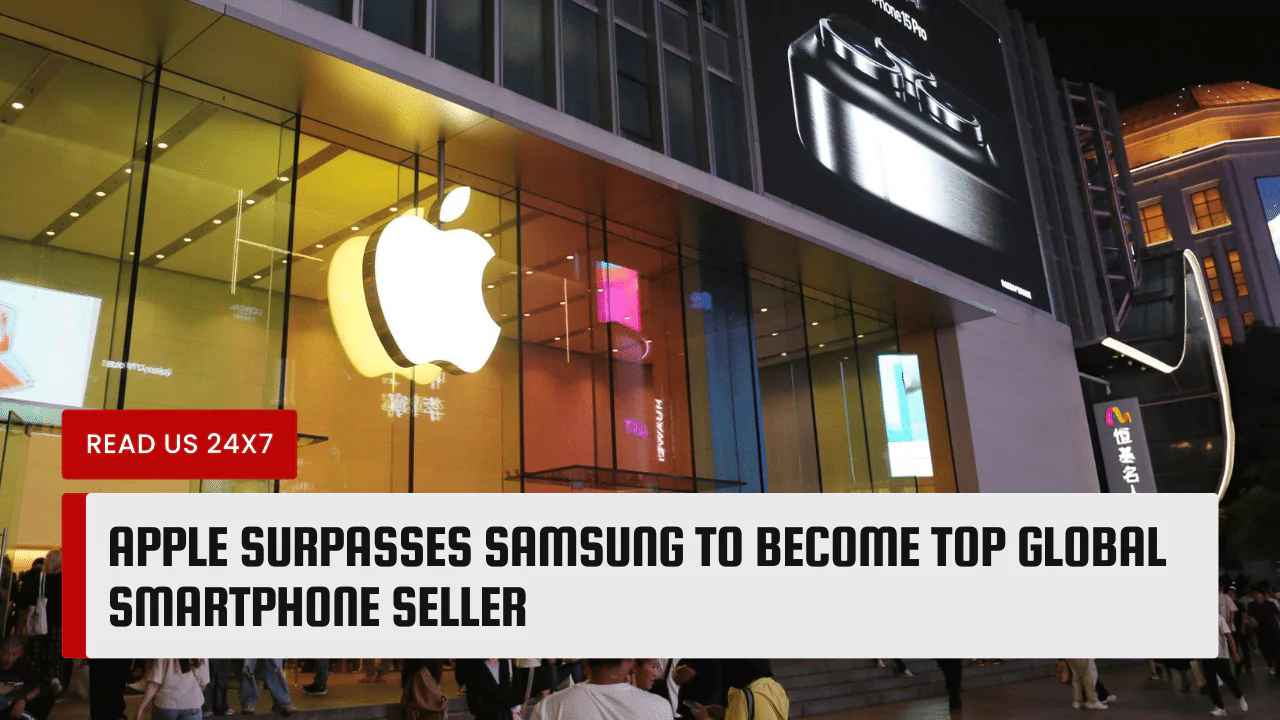According to the International Data Corporation (IDC), Apple surpassed Samsung as the world’s top smartphone seller in 2023, selling 234.6 million units compared to Samsung’s 226.6 million. This is the first time since 2010 that Apple has been the world’s top smartphone seller, ending Samsung’s 12-year run as the industry leader.
Apple’s success is attributed to the growing trend of premium devices, which now make up more than 20% of the market. This is fueled by aggressive trade-in offers and interest-free financing plans.
The change in ranking comes after a challenging year for the smartphone industry. Consumers have been slow to upgrade their smartphones and have been choosing cheaper handsets due to high inflation and economic uncertainty. A slower-than-expected recovery in China, the world’s largest smartphone market, has also weighed on overall phone sales.
Apple Takes Over Samsung As Top Global Smartphone Seller
Apple has recently surpassed Samsung to become the top global smartphone seller, with an increase in market share according to the International Data Corp (IDC) report and global sales data.
The shift in leadership demonstrates Apple’s continued success and dominance in the smartphone market.
Apple’s Increased Market Share
Apple now sits at the top as the global leader in smartphone sales. This giant leap in market share means one out of every five smartphones sold is an iPhone. The company’s slice of the market pie hit a whopping 20% this year.
Competition watches closely as only Apple and Transsion have seen their numbers go up. iPhones are flying off shelves, seeing a 3.7% increase in shipments. Meanwhile, Samsung faces tough times with their sales dipping by 13.6%.
IDC Report and Global Sales Data
The IDC report sheds light on a significant shift in the mobile phone landscape. iPhone shipments saw an increase of 3.7% last year, pushing Apple to grab a 20% market share. This surge led Apple to overtake Samsung as the top global smartphone seller, marking an end to Samsung’s 12-year lead.
Despite economic uncertainties and a total market decline of 3.2%, Apple found success while most other brands faced sales drops.
Samsung’s phone shipments plunged by 13.6%, leaving them with a slightly lower market share of 19.4%. The Korean tech giant saw its position slip not only due to strong competition from Apple but also from other players like Huawei and budget Chinese brands Xiaomi and Oppo, especially in emerging markets where there is high demand for low-end to mid-range smartphones.
Dive into Apple’s Success
Apple’s success can be attributed to a combination of factors, including its innovative product features and advancements in technology. The demand for iPhones, especially in the mid to high-end segment, has contributed significantly to Apple’s sales growth and market dominance.
Factors Contributing to the Success
Apple and Transsion stood out in 2023, as the only top smartphone vendors with sales growth. This success boiled down to a few key strategies. Apple slashed prices in China, facing tough competition from Huawei and budget-friendly Chinese brands.
These discounts helped keep iPhones attractive to shoppers.
Product innovations played a big role too. Customers showed strong demand for new iPhone features that competitors couldn’t match. Also, trade-in offers and interest-free financing plans made high-end gadgets like the iPhone more accessible to people who wanted premium devices without breaking the bank.
Product Features and Innovations
Transitioning from the factors contributing to Apple’s success, a key driver has been their focus on offering features and innovations that captivate consumers. The iPhone 15 Pro, with its advanced camera technology and enhanced battery life, has garnered significant attention.
Additionally, Apple’s dedication to staying ahead of the curve in terms of design aesthetics and user interface functionality has set them apart in the competitive smartphone market.
This commitment to constant improvement and innovation continues to be a core element of what makes Apple stand out in the industry.
Impact on Samsung
Apple’s ascent as the top global smartphone seller has undoubtedly impacted Samsung, resulting in a decrease in market share for the latter. This shift forces Samsung to reconsider its strategies and adapt to the changing market dynamics.
Samsung’s Decrease in Market Share
Samsung’s market share dropped to 19.4%, marking a decline of 13.6% in smartphone shipments, as reported by the International Data Corporation (IDC). The focus on mid to high-end segments for profitability led to a loss in the low-end segment, impacting its overall market share.
The decrease in Samsung’s market share has positioned Apple ahead with a commanding 20% market share. This shift reflects evolving consumer preferences and competitive strategies within the global smartphone industry.
Potential Strategies for Samsung
With Samsung’s decrease in market share and the challenging landscape, potential strategies need to address changing consumer preferences and regain sales momentum. One approach could involve focusing on affordable handsets that cater to the growing demand for budget-friendly options, aligning with the trend observed in 2023.
Additionally, enhancing product features and innovations across their smartphone range can attract consumers seeking advanced technology at competitive prices while differentiating Samsung from its competitors such as Xiaomi, Oppo, and Transsion.Emphasizing these strategies will allow Samsung to adapt to market conditions and stay ahead in the highly competitive smartphone industry.


